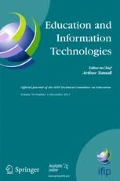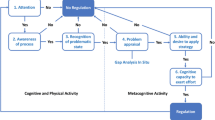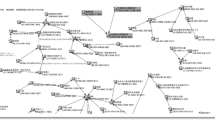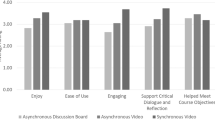Abstract
As colleges continue to expand online offerings, student participation within courses should be assessed to ensure that teachers can best implement effective, responsible lesson plans. This study examined discourse in an online classroom in order to gauge student participation by observing student-to-student and student-to-instructor exchanges within the discussion board. Classroom discourse was analyzed using Stahl’s computer supported collaborative learning methodology. Data was collected to assess development of classroom dialogue through group collaboration, and to determine whether participants were interpreting previous posts and contributing to the development of the discussion topic. This study shows that students within the online classroom were able to construct deeper meanings in classroom dialogues through thoughtful and personal contributions, thereby reaching new understandings through collaborative discussion. This study contends that through insightful planning and guided responses, instructors can manage online classroom discussions to better direct student communications in order to improve collaborative learning and knowledge construction.
Similar content being viewed by others
References
Barbosa, R., Jofili, Z., & Watts, D. M. (2004). Cooperating and constructing knowledge: case studies from chemistry and citizenship. International Journal of Science Education, 26(8), 935–950.
Bauer, L. B. (2012). Digital divides and literacy learning: A metaphor analysis of developmental college students’ and teachers’ conceptualizations of technology. Unpublished doctoral dissertation, University of Cincinnati, Cincinnati, Ohio.
Boostrom, R. E., Jr., Kurthakoti, R., & Summey, J. H. (1999). Enhancing class communications through networks. Marketing Education Review, 19(1), 37–41.
Bowker, G. C., & Star, S. L. (2000). Sorting things out: Classification and its consequences. Cambridge: The MIT Press.
Burgess, M. L. (2009). Using WebCT as a supplemental tool to enhance critical thinking and engagement among developmental reading students. Journal of College Reading and Learning, 39(2), 9–33.
Candela, A. (1999). Students’ power in classroom discourse. Linguistics and Education, 10(2), 139–163.
Capper, J. (2001). E-learning growth and promise for the developing world. Techknowlogia 6–10.
Chaika, G. (1999). Virtual high schools: The high schools of the future? Education World. Retrieved October 25, 2010 from http://education-world.com/a_curr/curr119.shtml.
Coiro, J. (2003). Exploring literacy on the internet. The Reading Teacher, 56(5), 458–464.
Coole, H., & Watts, M. (2009). Communal e-learning styles in the online classroom. Research in Education, 82, 13–27.
de Leon, L., Pena, C., & Whitacre, M. (2010). Fostering student discourse through an online student teacher support group: a phenomenological study. International Journal of Instructional Media, 37(4), 355–354.
Dennen, V. P., & Wieland, K. (2007). From interaction to intersubjectivity: facilitating online group discourse processes. Distance Education, 28(3), 281–297.
Elmer, D. (2007). Something different from the same-oh, same-oh: A survey of community college students’ competence in and use of technology in public speaking classes. Journal of Literacy and Technology, 8(1). Retrieved August 3, 2009 from http://www.literacyandtechnology.org/past_ed.htm.
Engstrom, E. U. (2005). Reading, writing, and assistive technology: an integrated developmental curriculum for college students. Journal of Adolescent and Adult Literacy, 49(1), 30–39.
Ferdig, R. E., & Roehler, L. R. (2004). Student uptake in electronic discussions: examining online discourse in literacy preservice classrooms. Journal of Research on Technology in Education, 36(2), 119–136.
Garrison, D. R., & Cleveland-Innes, M. (2005). Facilitating cognitive presence in online learning: interaction is not enough. The American Journal of Distance Education, 19(3), 133–148.
Hwang, A., & Arbaugh, J. B. (2009). Seeking feedback in blended learning: competitive versus cooperative student attitudes and their links to learning outcome. Journal of Computer Assisted Learning, 25(3), 280–293.
Johnson, D. W., & Johnson, R. T. (2000). The eight steps of ensuring diversity is a resource. The Newsletter of the Cooperative Learning Institute, 15(1), n.p.
Jones, B. J. (2003). Learning with, through, and about computers: students’ best friend or worst nightmare? Teaching English in the Two Year College, 30(3), 286–295.
Keengwe, J., Onchwari, G., & Agamba, J. (2014). Promoting effective e-learning practices through the constructivist pedagogy. Education and Information Technologies, 19(4), 887–898.
Kirschner, P. A., & Erkens, G. (2013). Toward a framework for CSCL research. Educational Psychologist, 48(1), 1–8.
Kuehner, A. V. (1999). The effects of computer instruction on college students’ reading skills. Journal of College Reading and Learning, 29(2), 149–157.
Lapadat, J. (2003). Teachers in an online seminar talking about talk: classroom discourse and school change. Language and Education, 17(1), 21–41.
Lee, K. (2007). Online collaborative case study learning. Journal of College Reading and Learning, 37(2), 82–100.
Liang, L. L., Ebenezer, J., & Yost, D. S. (2009). Characteristics of pre-service teachers’ online discourse: the study of local streams. Journal of Science Education and Technology, 19, 69–79.
Liaw, S. (2008). Investigating students’ perceived satisfaction, behavioral intention, and effectiveness of e-learning: a case study of the blackboard system. Computers & Education, 51(2), 864–873.
McMahon, M. (1997). Social constructivism and the World Wide Web: A paradigm for learning. Retrieved October 3, 2010, from http://www.ascilite.org.au/conferences/perth97/papers/Mcmahon/Mcmahon.html.
Moore, R. (2007). Academic motivation and performance of developmental education biology students. Journal of Developmental Education, 31(1), 24–34.
Nofsinger, R. E. (1999). Everyday conversations. Prospect Heights: Waveland.
Rourke, L., & Kanuka, H. (2007). Barriers to online discourse. Computer-Supported Collaborative Learning, 2, 105–126.
Schallert, D. L., Chiang, Y. V., Park, Y., Jordan, M. E., Lee, H., Cheng, A. J., Chu, H. R., Lee, S., Kim, T., & Song, K. (2009). Being polite while fulfilling different discourse functions in online classroom discussions. Computers & Education, 53, 713–725.
Singara, M. D., Battle, J., & Nicholson, S. A. (1998). E-mail ‘Booktalking’: Engaging developmental readers with authors and others in the academic community. Journal of College Reading and Learning, 29(1), 30(1). Retrieved July 6, 2009, from Expanded Academic ASAP via Gale: http://find.galegroup.com/gtx/start.do?prodId=EAIM&userGroupName=ucinc_main.
Smith, B. Q. (2004). Genre, medium, and learning to write: negotiating identities, enacting school-based literacies in adulthood. Journal of College Reading and Learning, 34(2), 75–96.
Stahl, G. (2006). Group cognition: Computer support for building collaborative knowledge. Cambridge: The MIT Press.
Upton, D. (2006). Online learning in speech and language therapy: student performance and attitudes. Education for Health, 19, 22–31.
Vacca, R. T. (2006). They can because they think they can. Educational Leadership, 63(5), 56–59.
Wertsch, J. V. (1985). Vygotsky and the social formation of mind. Cambridge: Harvard University Press.
Williams, S. W., Watkinds, K., Daley, B., Courtenay, B., Davis, M., & Dymock, D. (2001). Facilitating cross-cultural online discussion groups: implications for practice. Distance Education, 22(1), 151–167.
Xin, C., & Feenberg, A. (2006). Pedagogy in cyberspace: the dynamics of online discourse. Journal of Distance Education, 21(2), 1–25.
Yim, Y. K. (2011). Second language students’ discourse socialization in academic online communities. The Canadian Modern Language Review, 67(1), 1–27.
Zhang, S., & Duke, N. K. (2008). Strategies for internet reading with different reading purposes: a descriptive study of twelve good internet readers. Journal of Literacy Research, 40(1), 128–162.
Author information
Authors and Affiliations
Corresponding author
Appendices
Appendix A
1.1 Post-course instructor interview
How would you categorize yourself regarding the use of digital technologies? Inexperienced, experienced, something in between? How so?
Regarding the course [deleted], how did you like the online format? Do you feel the students learned as much in this class as they might in other typical face-to-face classes?
Regarding the course [deleted], do you think students were more motivated to participate in class discussions or less motivated than other typical face-to-face classes? Why do you think this is so?
Regarding the course [deleted], what did you think of the student-student interactions in the class? How would this compare to typical face-to-face classes?
Regarding the course [deleted], what did you think of the student-instructor interactions in the class? How would this compare to typical face-to-face classes?
If you could change something in the online format to help students learn more, what would you change?
Appendix B
2.1 Class discussion board instructions
2.1.1 Discussion board
There will be several points where you will be asked to participate in discussion board posts and replies to your classmates. These are less formal written assignments than papers and are meant to represent some of our class discussions in a traditional face-to-face class. Typically the discussion board will operate as follows:
-
1.
Students write an informal but thought provoking response to text we have read or a topic we are discussing. These can include ideas that were new to you this quarter, ideas that have clarified your understanding of something, ideas you strongly agree or disagree with, commentary about how these ideas are relevant to your daily lives, and connections you can see between multiple ideas or texts in the course overall.
-
2.
Students will then respond to a minimum of two peers. They will read the posts and respond by building on classmates’ ideas, clarifying information for classmates, expanding on the classmates’ ideas, connecting with classmates’ personal experiences, and questioning (respectfully and intellectually) classmates’ about their ideas.
-
3.
Students are responsible for maintaining their posts. This means that if someone comments on your posts, you are expected to acknowledge and respond to their comments. This is one of our dialogues when you will practice switching from reader to writer and back.
-
4.
The instructor will observe the discussion board throughout the week. Usually the instructor will not comment until the end of the week in an effort to allow classroom discussion to evolve without bias or guidance from the teacher. Each individual will receive at least one response from the instructor for each discussion board assignment.
It is the expectation that each student will treat each other and the instructor with professional respect of mutual learners. We learn not only from what we read by professional authors, but we the experiences and ideas of others. The discussion board should be a comfortable, relaxed environment where ideas can be exchanged.
Rights and permissions
About this article
Cite this article
Johnson, C.M. Rethinking online discourse: Improving learning through discussions in the online classroom. Educ Inf Technol 21, 1483–1507 (2016). https://doi.org/10.1007/s10639-015-9395-3
Published:
Issue Date:
DOI: https://doi.org/10.1007/s10639-015-9395-3




